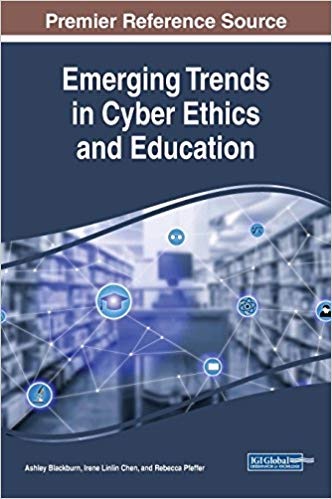
Emerging Trends in Cyber Ethics and Education
Date Reviewed: January 18, 2019
This edited volume is built around the belief that educators can no longer ignore issues of cyberethics in either the content they teach or the tools they use to teach it. Over the past few decades the internet, in its various manifestations, has integrated itself seamlessly into our lives to the point that questions about the responsible use of digital tools are unavoidable. Furthermore, most students are now “digital natives,” born into the digital age with no memory of life before the internet. This reality makes it all the more critical to teach cybercitizenship and responsible internet use in the classroom.
Emerging Trends in Cyberethics and Education covers an impressively diverse range of topics and contexts in the course of eleven essays. It treats both K-12 and university-level educational contexts and considers classes that take place strictly online as well as those that meet face to face. The essays fall into three broad categories based on how they approach questions of cyberethics in education. First, there are essays that examine the ethical implications of using educational technology in the classroom, including questions of inclusivity and equal access, the quality of education made possible by digital tools and online environments, plagiarism and intellectual property rights, and discerning the accuracy of information available on the web. Second, there are essays that assess the role of educators in responding to challenges students face in online environments outside the classroom, cyberbullying being the most salient example. Finally, there are essays that consider how educators can teach students to be ethical users of the internet, social media, and other digital tools. Nevertheless, it is consistently clear throughout the book that these are not separate questions; the overarching concern among the authors is the cultivation of “cybercitizens” who can better navigate the complex promises and challenges of life in the digital age. The way teachers model responsibility and thoughtfulness in their use of digital tools, the steps they take in responding to violations of their students’ safety and privacy outside the classroom, and their efforts to explicitly teach cyberethics all play a role in this cultivation.
Educators in all contexts and subject matter can make use of this volume and the challenging questions it raises; the theology and religious studies classroom is no exception. Religion classes are particularly well situated to cultivate students as citizens because the subject challenges students to critically reflect on their own beliefs and to understand those with very different ways of thinking and acting in the world. Teachers in these subjects must now consider how, in an era in which knowledge and human interaction is increasingly mediated through digital platforms, one can integrate questions about cyberethics and digital citizenship into course design. As the editors of this volume assert, “these discussions should no longer be optional” (xv).